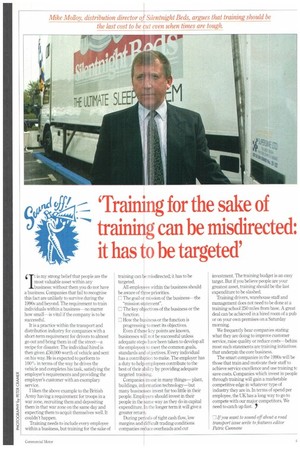(Lc( 'Training for the sake of
Page 49

If you've noticed an error in this article please click here to report it so we can fix it.
training can be misdirected: it has to be targeted'
g1 t is my strong belief that people are the most valuable asset within any
business: without them you do not have a business. Companies that fail to recognise this fact are unlikely to survive during the 1990s and beyond. The requirement to train individuals within a business—no matter how small—is vital if the company is to be successful.
It is a practice within the transport and distribution industry for companies with a short-term requirement for drivers to almost go out and bring them in off the street—a recipe for disaster. The individual hired is then given £50,000 worth of vehicle and sent on his way. He is expected to perform to 100"n in terms of the way he drives the vehicle and completes his task, satisfying the employer's requirements and providing the employer's customer with an exemplary service.
I liken the above example to the British Army having a requirement for troops in a war zone, recruiting them and depositing them in that war zone on the same day and expecting them to acquit themselves well. It couldn't happen.
Training needs to include every employee within a business, but training for the sake of training can be misdirected; it has to be targeted.
All employees within the business should be aware of three priorities.
7 The goal or mission of the business—the "mission snitement".
— The key objectives of the business or the function.
How the business or the function is progressing to meet its objectives.
Even if these key points are known, businesses will not be successful unless adequate steps have been taken to develop all the employees to meet the common goals, standards and objectives. Every individual has a contribution to make. The employer has a duty to help employees contribute to the best of their abiliiy by providing adequate targeted training.
Companies invest in many things— plant, buildings, infurn iation technology—but many businesses invest far too little in their people. Employers should invest in their people in the same way as they do in capital expenditure. In the longer term it will give a greater return.
During periods of tight cash flow, low margins and difficult trading conditions companies reduce overheads and cut investment. The training budget is an easy target. But if you believe people are your greatest asset, training should be the last expenditure to be slashed.
Training drivers, warehouse staff and management does not need to be done at a training school 250 miles from base. A great deal can be achieved in a hired room of a pub or on your own premises on a Saturday morning.
We frequently hear companies stating what they are doing to improve customer service, raise quality or reduce costs—behint most such statements are training initiatives that underpin the core business.
The smart companies in the 1990s will be those that train and motivate their staff to achieve service excellence and use training tc save costs. Companies which invest in people through training will gain a marketable competitive edge in whatever type of industry they are in. In terms of spend per employee, the UK has a long way to go to compete with our major competitors. We need to catch up fast. 9 —1 If you want to sound off about a road transport issue write to features editor Patric Cunnane




















































































